| Srl | Item |
| 1 |
ID:
122355
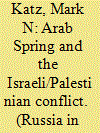

|
|
|
|
|
| Publication |
2013.
|
| Summary/Abstract |
The main impact of the Arab Spring has not been to increase, but to diminish the importance of the Israeli/Palestinian conflict for the broader politics of the Arab World.
|
|
|
|
|
|
|
|
|
|
|
|
|
|
|
|
| 2 |
ID:
121495
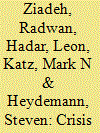

|
|
|
| 3 |
ID:
054295
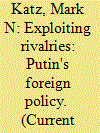

|
|
|
| 4 |
ID:
154315
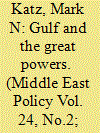

|
|
|
| 5 |
ID:
172034
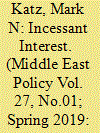

|
|
|
|
|
| Summary/Abstract |
Russia is a country that Western and other observers have often claimed pursues a grand strategy, and that it does so far more determinedly and successfully than its Western counterparts. The Middle East is a region in which not just the Soviet Union and now Putin's Russia have been described as successfully pursuing grand strategies. Tsarist Russia also did, and for a longer period than its successors. Still, both the Tsars and the Soviets experienced setbacks in the Middle East and elsewhere. However, as Russian observers have noted proudly (and Western ones ruefully), Russia has displayed a knack for recovering from setbacks and often becoming even stronger than before — thus enhancing its reputation for successfully pursuing a grand strategy.
|
|
|
|
|
|
|
|
|
|
|
|
|
|
|
|
| 6 |
ID:
133625
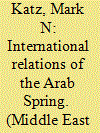

|
|
|
|
|
| Publication |
2014.
|
| Summary/Abstract |
Revolution does not just change things inside one country. It can disrupt international relationships throughout an entire region or even the world. What impact have the "Arab Spring" revolutions had on the international relations of the countries experiencing them, the Middle East, and the world? Have these upheavals been as disruptive of international relations as other revolutions? It will be argued here that, unlike what would occur if revolution succeeded in Syria or Bahrain, the Arab Spring revolutions that have succeeded in Tunisia, Egypt, Libya and Yemen have had a remarkably nondisruptive impact on international relations. To understand just how remarkable this is, though, something needs to be said about just how much revolution has disrupted international relations in the past.
|
|
|
|
|
|
|
|
|
|
|
|
|
|
|
|
| 7 |
ID:
067332
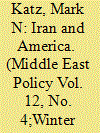

|
|
|
| 8 |
ID:
125351
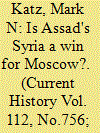

|
|
|
|
|
| Publication |
2013.
|
| Summary/Abstract |
The Kremlin's support of Bashar al-Assad's regime appears to be working for now, but protecting unpopular autocrats hardly seems a sustainable long-term strategy.
|
|
|
|
|
|
|
|
|
|
|
|
|
|
|
|
| 9 |
ID:
146059
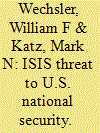

|
|
|
|
|
| Summary/Abstract |
I want to briefly go through my assessment of where we are in the fight against the Islamic State, how we got here, where we're going, and the lessons we should take from our experience thus far. Until last year, I was deputy assistant secretary of defense for special operations and combatting terrorism, where I worked on these issues on a daily basis and saw the evolution of our policies and our approach towards the Islamic State throughout that period.
|
|
|
|
|
|
|
|
|
|
|
|
|
|
|
|
| 10 |
ID:
060668
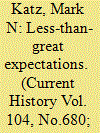

|
|
|
| 11 |
ID:
098890


|
|
|
|
|
| Publication |
2009.
|
| Summary/Abstract |
The following is an edited transcript of the fifty-eighth in a series of capital hill conference convened by the Middle East policy council.The meeting was held on October 23, 2009, in the United States capital building with Thomas R Mattair moderating.
|
|
|
|
|
|
|
|
|
|
|
|
|
|
|
|
| 12 |
ID:
124385
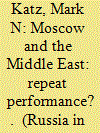

|
|
|
|
|
| Publication |
2012.
|
| Summary/Abstract |
When Vladimir Putin first came to power over a decade ago, he launched a foreign policy initiative to improve Russia's relations with and influence in the countries of the Middle East, which had languished during the Yeltsin era. By 2010, this initiative had succeeded dramatically. With the active involvement of Putin himself both through visiting several Middle Eastern countries as well as receiving their leaders in Moscow, Russia had established good working relations with all the major actors in the Middle East: anti-American Muslim governments (Iran and Syria) as well as pro-American ones (such as Saudi Arabia, Egypt, and Qatar) and even American-installed ones (Iraq and Afghanistan); Israel as well as Fatah and even Hamas and Hezbollah. Indeed, Russia had good relations with every government and most major opposition movements, with the notable exception of Al Qaeda (which did not want good relations with anyone except for movements similar to itself).
|
|
|
|
|
|
|
|
|
|
|
|
|
|
|
|
| 13 |
ID:
076100
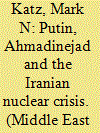

|
|
|
| 14 |
ID:
079970
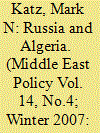

|
|
|
| 15 |
ID:
121498
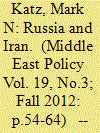

|
|
|
| 16 |
ID:
121519
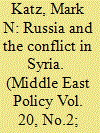

|
|
|
| 17 |
ID:
096906
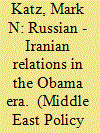

|
|
|
| 18 |
ID:
087379
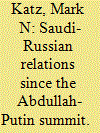

|
|
|
|
|
| Publication |
2009.
|
| Summary/Abstract |
In February 2007, then Russian
President Vladimir Putin visited Saudi
Arabia, the very fi rst visit by a top
Russian leader to the kingdom. The
Russian press expressed confi dence that
Saudi-Russian cooperation was about to
increase dramatically. However, similar
Russian hopes for Putin's visits to other
countries in the Middle East and elsewhere
in the developing world have remained
largely unfulfi lled. Saudi-Russian cooperation,
though, actually did increase after
Putin's 2007 trip to Riyadh. With Riyadh
signaling strong support for Russian policy
in Chechnya, giving its assent to Russian
accession to the World Trade Organization
(WTO) and signing a military-technical
cooperation agreement with Moscow in
July 2008, the Kremlin has reason to be
pleased. Moscow is disappointed, however,
that there have not been more Saudi
contracts with Russian businesses. Tension
between Moscow and Riyadh over Russia's
relations with Iran is also apparent, in part
due to the dramatic fall in the price of oil
since mid-2008. More fundamentally, Saudi
and Russian leaders appear to have different
expectations of improved Moscow-Riyadh
ties. This could well serve to limit their
willingness to cooperate.
|
|
|
|
|
|
|
|
|
|
|
|
|
|
|
|
| 19 |
ID:
027995
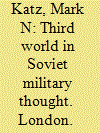

|
|
|
|
|
| Publication |
London, Croom Helm, 1982.
|
| Description |
188p.
|
| Standard Number |
0709915160
|
|
|
|
|
|
|
|
|
|
|
|
Copies: C:1/I:0,R:0,Q:0
Circulation
| Accession# | Call# | Current Location | Status | Policy | Location |
| 020541 | 355.033247/KAT 020541 | Main | On Shelf | General | |
|
|
|
|
| 20 |
ID:
133620


|
|
|
|
|
| Publication |
2014.
|
| Summary/Abstract |
I will focus my remarks on Gulf anxieties as they relate to U.S. foreign policy in the Middle East, specifically as they relate to U.S. policy vis-à-vis Iran, which is very much a hot topic. There are some deep structural sources of anxiety that have created tensions in the relationship between the United States and our closest partners in the Gulf. There is a widespread perception in the Gulf region that the United States is simply politically exhausted with the Middle East as a whole and with the Gulf in particular, after more than a decade of war in Iraq and Afghanistan. I think they see the U.S. drawdown from Iraq and the imminent drawdown from Afghanistan, and they wonder when the United States will start to draw down its 35,000 soldiers, sailors, airmen, Marines and others who are every day on mission in the Gulf region.
|
|
|
|
|
|
|
|
|
|
|
|
|
|
|
|